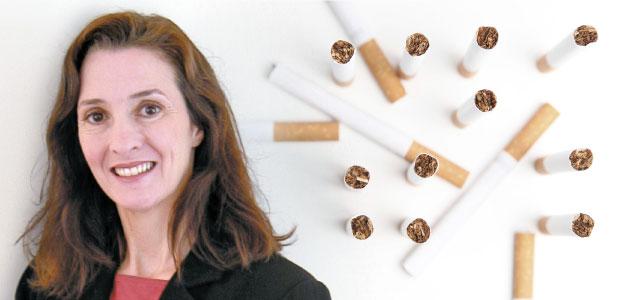
Stella Aguinaga Bialous
Fighting the World’s Tobacco Epidemic
Living in California with its no-smoking bars, restaurants and workplaces, we can easily assume that the state and the rest of the country are successfully tackling America’s tobacco problem.
Not really, says Stella Aguinaga Bialous, who arrived late last year to work as an associate professor for UC San Francisco School of Nursing. “Actually, the United States is not doing very well compared with other countries,” she says.
Bialous is in a position to assess any country’s successes or shortcomings in combating what the World Health Organization calls our “global tobacco epidemic.”
She is a globally renowned tobacco researcher, policy expert, nurse and nursing scholar, who began her career 30 years ago, caring for oncology patients in her native Brazil. She earned her master’s degree from Johns Hopkins University, researching smoking cessation among African American residents of Baltimore. At UCSF, she also joins the faculty of the Center for Tobacco Control Research and Education. She hopes to devote time to teaching and inspiring a new generation of nurses to lead efforts to fight the epidemic. She will also continue her research and advocacy on tobacco control.
With regard to US efforts around tobacco policy, she acknowledges that smoking rates have dropped dramatically since the Surgeon General issued its first report on smoking, in 1964. Still, 45 million American adults, teens and middle school students smoke, and smoking remains the single-largest cause of preventable disease and death in the US. A state-by-state legislative patchwork on tobacco policy undermines efforts to lower smoking-related health diseases in the US. “In the United States, being protected from secondhand smoke depends on what state you live in,” she says.
Bialous says her advocacy follows two parallel tracks. First, she works as a consultant with a variety of organizations, including the World Health Organization. She researches ways the tobacco industry uses lawsuits, marketing campaigns and other strategies to undermine domestic and international public health initiatives. This year, WHO and the Pan American Health Organization honored Bialous for exposing the tobacco industry’s role in blocking tobacco control progress, including efforts to tackle the illegal traffic of tobacco products in the Americas.
Second, she promotes nurses’ role in smoking-cessation initiatives. Because there are 19 million nurses globally – making them the world’s largest group of health care providers – they can have a major impact on fighting the epidemic. That’s one reason that she and Linda Sarna, interim dean at UCLA’s School of Nursing, co-founded Tobacco Free Nurses in 2003, to help nurses stop smoking and educate them to in turn help patients to quit.
Their efforts have paid off. In a study published last year, she and Sarna showed that the proportion of registered nurses in the United States who smoked dropped from 11 percent to 7 percent between 2003 and 2010-2011.
“We knew that if we provided nurses with the education and resources to stop smoking, they in turn could help their patients quit,” she says. “And if 19 million nurses and midwives can get just one patient a year to quit, the impact will be tremendous.”



